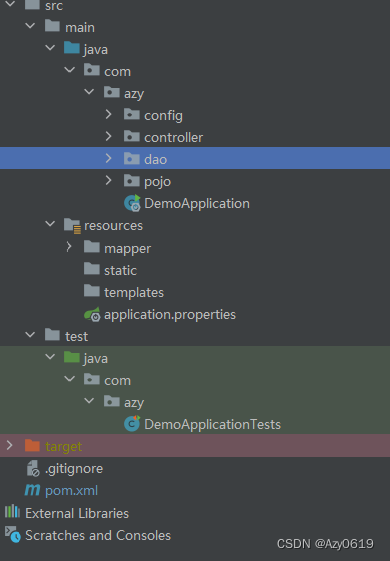您现在的位置是:首页 >技术交流 >SpringBoot整合mybatisplus网站首页技术交流
SpringBoot整合mybatisplus
1.什么是springboot自动装配?
自动装配是springboot的核心,一般提到自动装配就会和springboot联系在一起。实际上 Spring Framework 早就实现了这个功能。Spring Boot 只是在其基础上,通过 SPI 的方式,做了进一步优化。
SpringBoot 定义了一套接口规范,这套规范规定:SpringBoot 在启动时会扫描外部引用 jar 包中的META-INF/spring.factories文件,将文件中配置的类型信息加载到 Spring 容器(此处涉及到 JVM 类加载机制与 Spring 的容器知识),并执行类中定义的各种操作。对于外部 jar 来说,只需要按照 SpringBoot 定义的标准,就能将自己的功能装置进 SpringBoot
2.springboot注解:
@EnableAutoConfiguration:扫包范围默认当前类。
@ComponentScan(" “) 扫包范围默认当前类所在的整个包下面所有类。
扫包范围大于@EnableAutoConfiguration,@ComponentScan(” ")依赖于@EnableAutoConfiguration启动程序。
@EnableAutoConfiguration
@ComponentScan("第三方包 ")
app.run()
@SpringBootApplication 扫包范围同级包和当前包。
@SpringBootApplication 底层等同于@EnableAutoConfiguration+@ComponentScan。不扫描第三方包
3.springboot整合mybatisplus实现增删改查
1.首先导入相关依赖
<dependencies>
<dependency>
<groupId>org.springframework.boot</groupId>
<artifactId>spring-boot-starter-web</artifactId>
</dependency>
<dependency>
<groupId>com.baomidou</groupId>
<artifactId>mybatis-plus-boot-starter</artifactId>
<version>3.5.1</version>
</dependency>
<dependency>
<groupId>com.spring4all</groupId>
<artifactId>swagger-spring-boot-starter</artifactId>
<version>1.9.1.RELEASE</version>
</dependency>
<dependency>
<groupId>com.github.xiaoymin</groupId>
<artifactId>swagger-bootstrap-ui</artifactId>
<version>1.7.8</version>
</dependency>
<dependency>
<groupId>mysql</groupId>
<artifactId>mysql-connector-java</artifactId>
</dependency>
<dependency>
<groupId>org.projectlombok</groupId>
<artifactId>lombok</artifactId>
<optional>true</optional>
</dependency>
<dependency>
<groupId>org.springframework.boot</groupId>
<artifactId>spring-boot-starter-test</artifactId>
<scope>test</scope>
</dependency>
</dependencies>
2.创建数据表并添加数据
DROP TABLE IF EXISTS `category`;
CREATE TABLE `category` (
`cid` varchar(32) CHARACTER SET utf8mb3 COLLATE utf8mb3_general_ci NOT NULL,
`cname` varchar(50) CHARACTER SET utf8mb3 COLLATE utf8mb3_general_ci NULL DEFAULT NULL,
PRIMARY KEY (`cid`) USING BTREE
) ENGINE = InnoDB CHARACTER SET = utf8mb3 COLLATE = utf8mb3_general_ci ROW_FORMAT = DYNAMIC;
-- ----------------------------
-- Records of category
-- ----------------------------
INSERT INTO `category` VALUES ('c001', '家电');
INSERT INTO `category` VALUES ('c002', '鞋服');
INSERT INTO `category` VALUES ('c003', '化妆品');
INSERT INTO `category` VALUES ('c004', '汽车');
-- ----------------------------
-- Table structure for products
-- ----------------------------
DROP TABLE IF EXISTS `products`;
CREATE TABLE `products` (
`pid` varchar(32) CHARACTER SET utf8mb3 COLLATE utf8mb3_general_ci NOT NULL,
`pname` varchar(50) CHARACTER SET utf8mb3 COLLATE utf8mb3_general_ci NULL DEFAULT NULL,
`price` int NULL DEFAULT NULL,
`flag` varchar(2) CHARACTER SET utf8mb3 COLLATE utf8mb3_general_ci NULL DEFAULT NULL,
`category_id` varchar(32) CHARACTER SET utf8mb3 COLLATE utf8mb3_general_ci NULL DEFAULT NULL,
PRIMARY KEY (`pid`) USING BTREE,
INDEX `category_id`(`category_id`) USING BTREE,
CONSTRAINT `products_ibfk_1` FOREIGN KEY (`category_id`) REFERENCES `category` (`cid`) ON DELETE RESTRICT ON UPDATE RESTRICT
) ENGINE = InnoDB CHARACTER SET = utf8mb3 COLLATE = utf8mb3_general_ci ROW_FORMAT = DYNAMIC;
-- ----------------------------
-- Records of products
-- ----------------------------
INSERT INTO `products` VALUES ('p001', '小
米电视 机', 5000, '1', 'c001');
INSERT INTO `products` VALUES ('p002', '格
力空调', 3000, '1', 'c001');
INSERT INTO `products` VALUES ('p003', '美
的冰箱', 4500, '1', 'c001');
INSERT INTO `products` VALUES ('p004', '篮
球鞋', 800, '1', 'c002');
INSERT INTO `products` VALUES ('p005', '运
动裤', 200, '1', 'c002');
INSERT INTO `products` VALUES ('p006', 'T
恤', 300, '1', 'c002');
INSERT INTO `products` VALUES ('p009', '篮球', 188, '1', 'c002');
3.在项目中创建如下目录

4.在resources下创建application.propertis并配置数据源
spring.datasource.driver-class-name=com.mysql.cj.jdbc.Driver
spring.datasource.username=root
spring.datasource.password=123456
spring.datasource.url=jdbc:mysql:///springboot
#日志
mybatis.configuration.log-impl=org.apache.ibatis.logging.stdout.StdOutImpl
mybatis.mapper-locations=classpath:mapper/*.xml
5.在pojo下创建实体类
package com.azy.pojo;
import java.io.Serializable;
import com.baomidou.mybatisplus.annotation.IdType;
import com.baomidou.mybatisplus.annotation.TableField;
import com.baomidou.mybatisplus.annotation.TableId;
import com.baomidou.mybatisplus.annotation.TableName;
import lombok.AllArgsConstructor;
import lombok.Data;
import lombok.NoArgsConstructor;
/**
* products
* @author
*/
@Data
@AllArgsConstructor
@NoArgsConstructor
@TableName(value = "products")
public class Products implements Serializable {
@TableId(type = IdType.AUTO)
private String pid;
public Products(String pid, String pname, Integer price) {
this.pid = pid;
this.pname = pname;
this.price = price;
}
private String pname;
private Integer price;
private String flag;
private String category_id;
@TableField(exist = false)
private Category category;
private static final long serialVersionUID = 1L;
}
6.在dao层下创建ProductDao这个接口,由于mybatisplus封装了单表的增删改查,所有只需继承BaseMapper这个接口就ok
package com.azy.dao;
import com.azy.pojo.Products;
import com.baomidou.mybatisplus.core.conditions.Wrapper;
import com.baomidou.mybatisplus.core.mapper.BaseMapper;
import com.baomidou.mybatisplus.core.metadata.IPage;
import org.apache.ibatis.annotations.Param;
/**
* @ fileName:ProductsDao
* @ description:
* @ author:Azy
* @ createTime:2023/4/11 18:57
* @ version:1.0.0
*/
public interface ProductsDao extends BaseMapper<Products> {
IPage<Products> findPage(IPage<Products> iPage, @Param("ew") Wrapper<Products> wrapper);
}
7.在resources下面的mapper下创建ProductsDao.xml
<?xml version="1.0" encoding="UTF-8" ?>
<!DOCTYPE mapper PUBLIC "-//mybatis.org//DTD Mapper 3.0//EN"
"http://mybatis.org/dtd/mybatis-3-mapper.dtd">
<mapper namespace="com.azy.dao.ProductsDao">
<resultMap id="ProductsMap" type="com.azy.pojo.Products" autoMapping="true">
<id property="pid" column="pid" jdbcType="VARCHAR"/>
<result property="pname" column="pname" jdbcType="VARCHAR"/>
<result property="price" column="price" jdbcType="INTEGER"/>
<result property="flag" column="flag" jdbcType="VARCHAR"/>
<result property="category_id" column="category_id" jdbcType="VARCHAR"/>
<association property="category" javaType="com.azy.pojo.Category" autoMapping="true">
<id column="cid" property="cid" jdbcType="VARCHAR"/>
<result property="cname" column="cname" jdbcType="VARCHAR"/>
</association>
</resultMap>
<select id="findPage" resultType="com.azy.pojo.Products" resultMap="ProductsMap">
select *
from products p
join category c
on p.category_id=c.cid
<if test="ew!=null">
<where>
${ew.sqlSegment}
</where>
</if>
</select>
</mapper>
8.在test包下的测试类中测试
package com.azy;
import com.azy.dao.ProductsDao;
import com.azy.dao.UserDao;
import com.azy.pojo.Products;
import com.azy.pojo.User;
import com.baomidou.mybatisplus.core.conditions.query.QueryWrapper;
import com.baomidou.mybatisplus.extension.plugins.pagination.Page;
import org.junit.jupiter.api.Test;
import org.springframework.beans.factory.annotation.Autowired;
import org.springframework.boot.test.context.SpringBootTest;
import javax.annotation.Resource;
import java.util.List;
@SpringBootTest
class DemoApplicationTests {
@Resource
private UserDao userDao;
@Test
void contextLoads() {
QueryWrapper<User> wrapper = new QueryWrapper<>();
wrapper.likeRight("name","_z");
wrapper.or();
wrapper.between("age",10,20);
wrapper.orderByDesc("age");
wrapper.select("name","age");
List<User> users = userDao.selectList(wrapper);
users.forEach(System.out::println);
}
@Test
public void delete(){
System.out.println(userDao.deleteById(5));
}
@Test
public void insert(){
User user = new User();
user.setAge(18);
user.setName("cxk");
user.setEmail("123@qq.com");
System.out.println(userDao.insert(user));
}
@Test
public void update(){
User user = new User();
user.setAge(19);
user.setName("azy");
user.setEmail("321@qq.com");
user.setId(6L);
System.out.println(userDao.updateById(user));
}
@Test
public void selectById(){
System.out.println(userDao.selectById(4));
}
@Test
public void testPage(){
Page<User> page = new Page<>(1, 3);//current:当前第几页 size:每页显示条数
userDao.selectPage(page,null);//把查询分页的结构封装到page对象中
System.out.println("当前页的记录"+page.getRecords());//获取当前页的记录
System.out.println("获取总页数"+page.getPages());//获取当前页的总页数
System.out.println("获取总条数"+page.getTotal());//获取当前页的记录
}
// ==============================================================
@Resource
private ProductsDao productsDao;
@Test
public void testQueryProductById(){
System.out.println(productsDao.selectById("p008"));
}
@Test
public void testDelete(){
System.out.println(productsDao.deleteById("p008"));
}
@Test
public void testInsert(){
Products products = new Products();
products.setPname("滑板鞋");
products.setFlag("2");
products.setPrice(8888);
products.setCategory_id("c002");
products.setPid("p009");
System.out.println(productsDao.insert(products));
}
@Test
public void testUpdate(){
Products products = new Products();
products.setPname("篮球");
products.setFlag("1");
products.setPrice(188);
products.setCategory_id("c002");
products.setPid("p009");
System.out.println(productsDao.updateById(products));
}
@Test
public void testProductsPage(){
Page<Products> page = new Page<>(1, 3);//current:当前第几页 size:每页显示条数
productsDao.selectPage(page,null);//把查询分页的结构封装到page对象中
System.out.println("当前页的记录"+page.getRecords());//获取当前页的记录
System.out.println("获取总页数"+page.getPages());//获取当前页的总页数
System.out.println("获取总条数"+page.getTotal());//获取当前页的记录
}
@Test
public void testProductsPage2(){
Page<Products> page=new Page<>(1,3);
QueryWrapper<Products> wrapper=new QueryWrapper<>();
wrapper.gt("price",1000);
productsDao.findPage(page,wrapper);
System.out.println("当前页的记录"+page.getRecords());//获取当前页的记录
System.out.println("获取总页数"+page.getPages());//获取当前页的记录
System.out.println("获取总条数"+page.getTotal());//获取当前页的记录
}
}
9.最后运行测试类

测试完成






 U8W/U8W-Mini使用与常见问题解决
U8W/U8W-Mini使用与常见问题解决 QT多线程的5种用法,通过使用线程解决UI主界面的耗时操作代码,防止界面卡死。...
QT多线程的5种用法,通过使用线程解决UI主界面的耗时操作代码,防止界面卡死。... stm32使用HAL库配置串口中断收发数据(保姆级教程)
stm32使用HAL库配置串口中断收发数据(保姆级教程) 分享几个国内免费的ChatGPT镜像网址(亲测有效)
分享几个国内免费的ChatGPT镜像网址(亲测有效) Allegro16.6差分等长设置及走线总结
Allegro16.6差分等长设置及走线总结